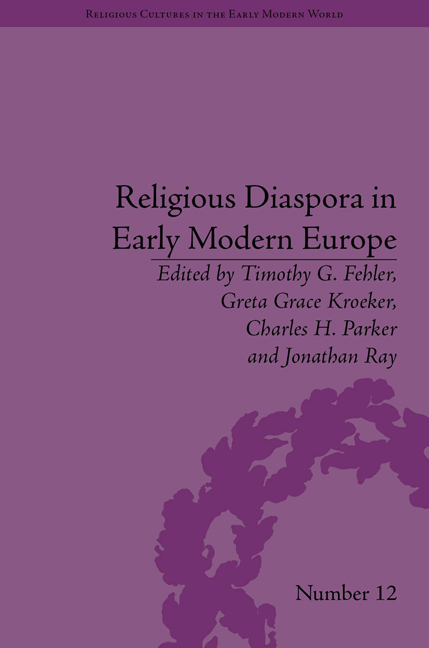Book contents
- Frontmatter
- CONTENTS
- Acknowledgements
- List of Contributors
- List of Figures
- Introduction
- Part I Tactics for Inclusion
- Part II Programmes of Restoration
- 4 Exile, Education and Eschatology in the Works of Jan Amos Comenius and John Milton
- 5 Missionaries as Exiles: Calvinist Strategies for Restoration in Communities under the Dutch East India Company
- 6 Niccolò Guidalotto da Mondavio and his City View of Constantinople (1662): The Experience of an Exile
- 7 Educating for Martyrdom: British Exiles in the English College at Valladolid
- Part III Methods of Coping
- Notes
- Index
5 - Missionaries as Exiles: Calvinist Strategies for Restoration in Communities under the Dutch East India Company
from Part II - Programmes of Restoration
- Frontmatter
- CONTENTS
- Acknowledgements
- List of Contributors
- List of Figures
- Introduction
- Part I Tactics for Inclusion
- Part II Programmes of Restoration
- 4 Exile, Education and Eschatology in the Works of Jan Amos Comenius and John Milton
- 5 Missionaries as Exiles: Calvinist Strategies for Restoration in Communities under the Dutch East India Company
- 6 Niccolò Guidalotto da Mondavio and his City View of Constantinople (1662): The Experience of an Exile
- 7 Educating for Martyrdom: British Exiles in the English College at Valladolid
- Part III Methods of Coping
- Notes
- Index
Summary
The globalization of Christianity in its Roman Catholic and various Protestant guises got underway in the context of European empire building in Africa, America and Asia in the early modern period. Under the auspices of the Dutch East India Company (VOC), Reformed Protestant (Calvinist) missionaries appeared in the East Indies in the early 1600s, making them among the first evangelists to spread a Protestant faith outside of Europe. The opportunities that maritime technology and capital investment afforded the VOC for commerce and conquest also gave Calvinist pastors an opening to ‘go and make disciples of all nations’. During the seventeenth and eighteenth centuries, hundreds of missionaries left their homes in the Netherlands for strange new lands to baptize, catechize and Christianize native peoples. Often expressing a cheerful optimism, many Dutch Calvinist ministers saw this movement as a critical moment in Christian and world history. In March 1622, for example, Adriaan Hulsebos, a pioneering missionary in Banda (part of the Molucca Islands in present-day Indonesia), declared that ‘the Lord by one means or the other and at some time will be pleased to call many moors and heathens into belief and eternal salvation’. Another even predicted that ‘God has not been pleased until this time to make known his salvation to China and many lands in the East and West Indies’.
- Type
- Chapter
- Information
- Religious Diaspora in Early Modern EuropeStrategies of Exile, pp. 61 - 74Publisher: Pickering & ChattoFirst published in: 2014



